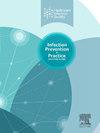Assessment of Methicillin-Resistant Staphylococcus aureus (MRSA) knowledge and awareness among healthcare workers in South-Lebanon
IF 1.9
Q3 INFECTIOUS DISEASES
引用次数: 0
Abstract
Background
Methicillin-Resistant Staphylococcus aureus (MRSA) is a well-known cause of hospital acquired infections (HAIs), associated with high rates of morbidity and mortality. In healthcare settings, MRSA can spread via contaminated surfaces and direct contact.
Objective
This study aims to assess the knowledge and awareness of MRSA risks, prevention methods (such as hand hygiene), proper antibiotics use, and multidrug resistance among various groups of healthcare workers (HCWs) in Southern Lebanon.
Methods
A total of 244 HCWs, including those in medical services (MS), paramedical services (PS), and non-medical services (NMS), were conveniently selected for this study. Data was gathered using a structured, validated questionnaire that explored their knowledge and awareness of MRSA risks, prevention measures, hand hygiene practices, and multidrug resistance.
Results
The findings revealed that 68% of HCWs were aware of the origin of MRSA infection, and 61.5% and 51.6% were familiar with its treatment and transmission, respectively. Only 24.2% of HCWs were able to differentiate between hospital-acquired and community-acquired MRSA, 14.7% were aware of the institution's written MRSA control protocols, and 17.6% had heard of MRSA infections. Notably, knowledge and hand hygiene practices were significantly better among MS HCWs than PS and NMS groups (P<0.0001). While all HCWs were familiar with antibiotic usage and drug resistance, NMS HCWs were more likely to use antibiotics without a prescription compared to MS and PS groups (P<0.003).
Conclusion
HCWs in South-Lebanon demonstrated a knowledge gap regarding MRSA risks and prevention guidelines. These findings underscore the need for targeted educational intervention on MRSA, as well as coordinated efforts by healthcare authorities and centres to control MRSA infections.
黎巴嫩南部卫生保健工作者对耐甲氧西林金黄色葡萄球菌(MRSA)知识和意识的评估
背景耐甲氧西林金黄色葡萄球菌(MRSA)是众所周知的医院获得性感染(HAIs)的原因,与高发病率和死亡率相关。在医疗环境中,MRSA可以通过污染的表面和直接接触传播。目的本研究旨在评估黎巴嫩南部不同群体卫生保健工作者(HCWs)对MRSA风险、预防方法(如手卫生)、正确使用抗生素和多药耐药性的知识和意识。方法选取244名医疗服务(MS)、辅助医疗服务(PS)和非医疗服务(NMS)的卫生保健工作者作为研究对象。通过结构化的、有效的问卷调查收集数据,探讨他们对MRSA风险、预防措施、手部卫生习惯和多药耐药性的知识和意识。结果68%的医护人员了解MRSA感染的来源,61.5%的医护人员了解MRSA的治疗方法,51.6%的医护人员了解MRSA的传播途径。只有24.2%的医护人员能够区分医院获得性和社区获得性MRSA, 14.7%的医护人员知道医院的MRSA书面控制方案,17.6%的医护人员听说过MRSA感染。值得注意的是,MS组的卫生知识和手卫生习惯明显优于PS组和NMS组(P<0.0001)。虽然所有医护人员都熟悉抗生素的使用和耐药情况,但与MS组和PS组相比,NMS组更有可能在没有处方的情况下使用抗生素(P<0.003)。结论黎巴嫩南部的卫生保健工作者在MRSA风险和预防指南方面存在知识缺口。这些发现强调了有针对性的MRSA教育干预的必要性,以及卫生保健当局和中心协调努力控制MRSA感染的必要性。
本文章由计算机程序翻译,如有差异,请以英文原文为准。
求助全文
约1分钟内获得全文
求助全文
来源期刊

Infection Prevention in Practice
Medicine-Public Health, Environmental and Occupational Health
CiteScore
4.80
自引率
0.00%
发文量
58
审稿时长
61 days
 求助内容:
求助内容: 应助结果提醒方式:
应助结果提醒方式:


